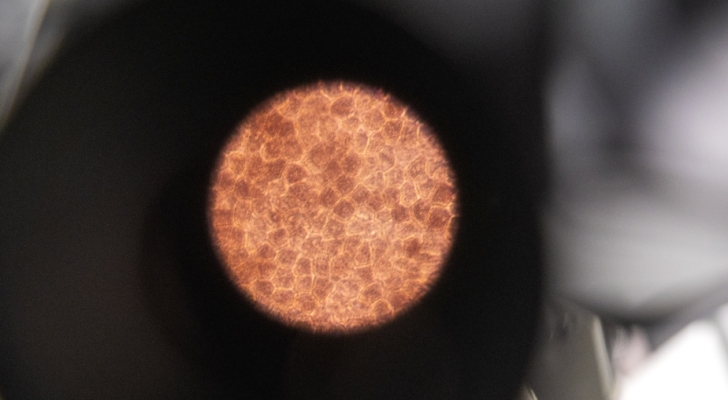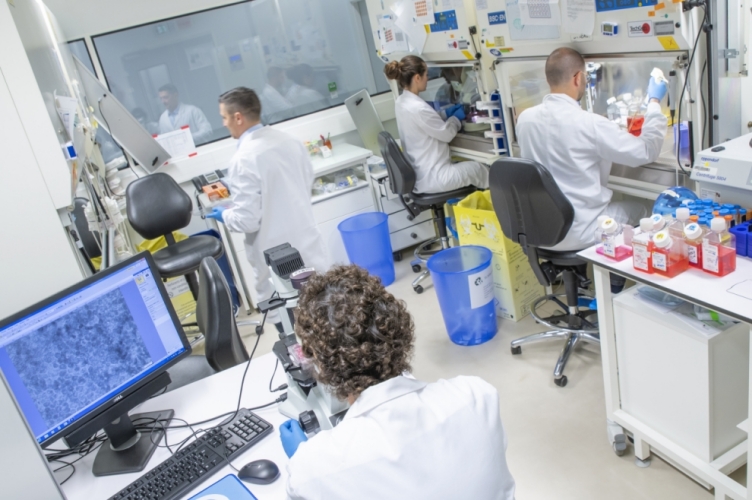Retinopathies
Our team is working on the development of innovative therapies for the treatment of genetic pathologies that affect the retina (retinopathies). We base our work on the potential of human pluripotent stem cells.
Degenerative diseases of the retina are a major cause of vision loss throughout the world. Today, they often remain incurable (only a few drugs exist: LuxturnaTM, gene therapy for Leber’s Amaurosis (RPE65); SyfovreTM, anti-complication for atrophic AMD and anti-VEGF for the wet form of AMD) and lead more or less rapidly to blindness in patients. In France, approximately 40,000 people are affected by hereditary diseases and more than 1.5 million by age-related macular degeneration (AMD). Progressive and very disabling, retinal diseases are characterized by a progressive degeneration of the cells lining the retina, particularly the photoreceptors. The most numerically important inherited degenerative retinal diseases are the pigmentary retinopathies. These diseases are caused by more than 70 genes and can cause visual impairment at any age.
The team’s project is articulated around 2 main axes:
• The production of functional retinal progenitors from human pluripotent cells (hPSC) for use in cell therapy. Because of their pluripotency and their capacity to differentiate infinitely, hPSCs represent a source of retinal progenitors that can be used in cell therapy. The team is developing protocols for guided differentiation of pluripotent cells towards different cell populations of the retina (retinal pigment epithelium cells, (RPE) and photoreceptors). Part of these protocols has been adapted on a culture automaton allowing large-scale culture of these cells (Régent et al., 2019). Moreover, in collaboration with Dr Hamouda (Université Paris-Saclay) and Pr Letourneur (Inserm U698), we have developed cell engineering products that combine matrices/scaffolds and cells recapitulating the cellular organization of the retina. A clinical cell therapy program that started in 2019 is currently underway (NCT03963154).
• The study of genetic retinal pathologies using hPSC lines carrying mutations, with the aim of identifying biological markers associated with the mutation and then initiating the screening of potentially therapeutic molecules (Lustremant et al., 2013; Régent et al.). Our studies focus on Alström syndrome.
Team members
Christelle MONVILLE
Team Leader, Pr. & VP Research
Professor, Université Evry-Paris Saclay.
Vice-President of Research (university) since 2023 January.
Walter HABELER
Researcher (CECS)
Researcher in the retinopathy team since its creation, Walter is specialized in the use of retinal epithelial cells derived from pluripotentstem cells for cell therapy approach.
Alexandra PLANCHERON
Research Technician (CECS)
A member of the Retinopathies team at I-Stem from the outset, Alexandra is involved in the STREAM cell therapy project, as well as the team’s other research projects. She is working on the immunological characterization of retinal pigment epithelium cells.
Karim BEN M’BAREK
Researcher (CECS)
Karim arrived in 2012 as an INSERM post-doc after a thesis done at the Institut Curie, and has been a research fellow in the team since 2017. He obtained my HDR in 2022.
Camille GEIGER
Engineer (CECS)
Camille joined I-Stem in April 2021 as a design engineer following a Master’s degree in Biotechnology. Her project involves bioengineering retinal tissue for use as a cell therapy product.
Hélène ARNOULD
Post-Doctorate
Joining the Retinopathies team in September 2023 as a post-doctoral fellow, Hélène is seeking to establish a 3D cell co-culture model of the blood-retinal barrier with a view to cell therapy.
Abdallah Abuelhassan
PhD student
Abdallah joined the Retinopathies Masters team in February 2024. He was awarded the École Doctorale scholarship from the Université d’Évry Paris-Saclay in October 2024. His thesis focuses on the development of 2D and 3D cellular models of Alström syndrome and the screening of potentially therapeutic molecules.
Collaborations
Use of Biodegradable Matrices for the culture and transplantation of cells derived from hES.
ANR Cardiostem
ANR Cardiostem
Publications
Charting the translational pathway: ISSCR best practices for the development of PSC-derived therapies.
22 January 2026
Stem cell reports
Engineered micro-structured biomimetic material for modelling the outer blood-retinal barrier.
01 November 2025
Biomaterials
Biomechanical Characterization of Retinal Pigment Epitheliums Derived from hPSCs Using Atomic Force Microscopy.
01 July 2024
Stem cell reviews and reports

